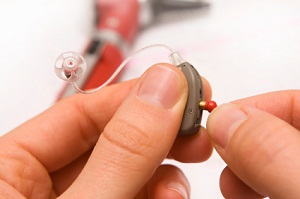Career Profile: Audiologist

 Why is Audiology a Job of Tomorrow?
Why is Audiology a Job of Tomorrow?
As a specialty field, audiology is an often overlooked part of the health care sector, but it plays an important role in the overall health of the young and older populations. As people age, they inevitably begin experiencing hearing loss, which is something audiologists are trained to handle. With the size of the elderly population growing, audiologists will stay busy well into the next decade. Employment opportunities for audiologists are expected to rise 10 percent, according to the Bureau of Labor Statistics. The average annual salary for audiologists is $57,120.
What Does an Audiologist Do?
Audiologists help patients with hearing, balance and other ear-related issues. They are trained to identify auditory and balance disorders, and often conduct hearing tests to ensure that patients are in optimal aural health. One of the main things audiologists do is provide hearing aids. They map cochlear implants, help families cope with young hearing-impaired children and aid deaf adults in adjusting to hearing loss. Audiologists can specialize in a variety of fields, including working exclusively with children or adults. Many take part in research and the development of hearing instruments and technology, working with other medical specialists, speech-language pathologists, educators, engineers, scientists and technicians, according to the National Student Speech Language Hearing Association. Audiologists can work in a hospital or private practice, with a physician or independently.
What Kind of Training Do I Need to Become an Audiologist?
Audiologists must have at least a master's level degree in audiology, although more and more employers are seeking those with a doctoral degree. A master's degree program typically takes two to three years to complete after earning a bachelor's degree, and a doctoral degree typically takes four years to complete, as well as an additional four years of professional work. Course work for audiology degree programs covers such subjects as ear anatomy, physics and genetics. Many audiologists also learn sign language to communicate with deaf or hearing-impaired patients. After graduating from an accredited degree program, prospective audiologists must become licensed to practice. Some states have continuing education requirements for audiologists, which ensure that they stay current with developments in the field.
Other Jobs in Business
Job Opportunities
- Anesthesiologist
- Athletic Trainer
- Audiologist
- Biomedical Equipment Technician
- Cardiovascular Technician
- Chiropractor
- Clinical Nurse Specialist
- Clinical Psychologist
- Dental Assistant
- Emergency Paramedic
- Family and Marriage Therapist
- Gynecologist
- Health Information Technician
- Health Policy Specialist
- Health Services Administrator
- Long-Term Care Administrator
- Massage Therapist
- Medical Assistant
- Medical Scientist
- Mental Health Counselor
- Nurse Administrator
- Nurse Anesthetist
- Nurse Midwife
- Nurse Practitioner
- Obstetrician
- Occupational Therapist
- Optometrist
- Pharmaceutical Sales
- Pharmacy Technician
- Physical Therapist
- Physician
- Physician Assistant
- Podiatrist
- Psychiatrist
- Substance Abuse and Behavioral Disorder Counselor
- Surgeon
- Ultrasound Technician
- Veterinarian